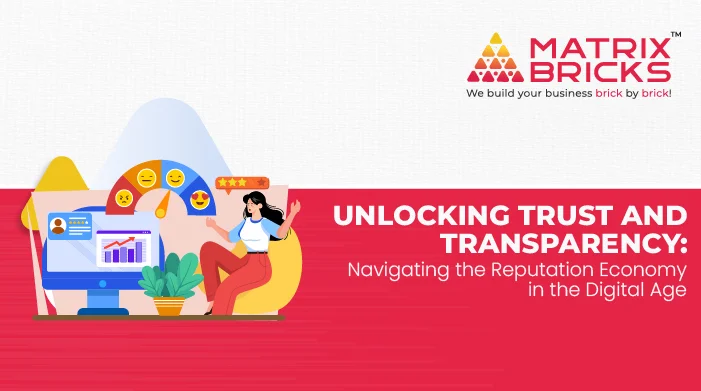
In today’s digital landscape, trust and transparency reign supreme. As consumers increasingly rely on online platforms for everything from purchasing products to choosing service providers, the importance of reputation cannot be overstated. In this blog post, we’ll explore the significance of trust and transparency in the digital age and discuss strategies for businesses to navigate the reputation economy successfully.

Understanding the Reputation Economy
In the digital age, reputation is everything. With social media platforms, online review sites, and forums, consumers have a powerful voice that can shape the reputation of a business virtually overnight. This shift has given rise to what is known as the reputation economy, where a company’s success is heavily influenced by its online reputation.
In the reputation economy, businesses must actively manage their online presence to ensure that they are portrayed in a positive light. This involves monitoring online reviews, engaging with customers on social media, and addressing any negative feedback promptly. By actively managing their reputation, businesses can build trust with consumers and differentiate themselves from competitors in the crowded digital marketplace.
Online Reputation Management in the Digital Age
In today’s digital age, managing your online reputation is more important than ever. With consumers increasingly turning to the internet to research brands and make purchasing decisions, your online reputation can make or break your business. From monitoring online reviews to engaging with customers on social media, effective online reputation management is essential for building trust and credibility in the digital marketplace. Don’t leave your reputation to chance—take proactive steps to manage it effectively and ensure your brand’s success in the digital age.
The Importance of Trust and Transparency
Trust is the currency of the digital age. With consumers having access to a wealth of information at their fingertips, they are more discerning than ever before. Studies show that a vast majority of consumers trust online reviews as much as personal recommendations. This means that maintaining a positive reputation is crucial for businesses looking to attract and retain customers.
Transparency goes hand in hand with trust. In an age where misinformation can spread like wildfire, being open and honest with your audience is paramount. Businesses that are transparent about their practices, policies, and values are more likely to earn the trust of their customers.
Building Trust in the Digital Age
So, how can businesses navigate the reputation economy and build trust in the digital age? The answer lies in fostering authentic connections with their audience and prioritizing transparency in all aspects of their operations.
1. Deliver Consistent Value: Building trust starts with delivering consistent value to your customers. Whether through high-quality products, exceptional service, or valuable content, aim to exceed your customers’ expectations at every touchpoint.
2. Build Relationships: Invest in building genuine, meaningful relationships with your customers. Engage with them on social media, respond to comments and messages, and show appreciation for their support.
3. Prioritize Customer Experience: Focus on providing exceptional customer experiences at every touchpoint. Listen to feedback, address concerns promptly, and strive to exceed expectations.
4. Consistency: Consistency breeds trust. Businesses should maintain a consistent brand voice, messaging, and quality across all channels and touchpoints. By delivering a cohesive experience, companies can instill confidence and reliability in their audience.
5. Prioritize Data Security: With growing concerns over data privacy and security, safeguarding your customers’ information is paramount. Be transparent about your data collection and usage practices, and implement robust security measures to protect sensitive information.
6. Deliver on Promises: Consistently deliver high-quality products or services that align with your brand promise. Building a reputation for reliability and consistency is key to earning the trust of your audience.
7. Invest in Online Reputation Management: Consider investing in online reputation management services to help monitor and improve your online presence. These services can help you proactively manage your reputation and mitigate any negative feedback.

Navigating Challenges in the Reputation Economy
While the reputation economy offers unprecedented opportunities for businesses to connect with their audience, it also presents a unique set of challenges.
1. Managing Online Reviews: With the proliferation of online review platforms, businesses must actively manage their online reputation. Monitor reviews regularly, respond promptly to feedback (both positive and negative), and take proactive steps to address any issues raised by customers.
2. Combatting Misinformation: In an age of fake news and misinformation, businesses must be vigilant in combatting false or misleading information that could damage their reputation. Proactively address any inaccuracies or misconceptions and strive to provide accurate, trustworthy information to your audience.
3. Building Trust Across Channels: With consumers engaging with brands across multiple channels, consistency is key to building trust. Ensure that your messaging and branding are consistent across all touchpoints, from your website and social media profiles to email communications and in-store interactions.
4. Navigating Public Relations Crises: In the event of a public relations crisis, transparency and swift, decisive action are essential. Be honest about any mistakes or shortcomings, communicate openly with your audience, and take steps to rectify the situation and rebuild trust.
5. Respond Appropriately: When faced with negative feedback or criticism, respond calmly and professionally. Avoid getting defensive or engaging in confrontational exchanges. Instead, acknowledge the issue, offer a sincere apology if necessary, and take steps to rectify the situation.
6. Be Transparent: In times of crisis, transparency is key. Be transparent about what went wrong, how you’re addressing the issue, and what steps you’re taking to prevent similar incidents in the future. Transparency demonstrates accountability and helps rebuild trust.
7. Stay Authentic: Authenticity is key to building trust in the digital age. Be true to your brand values and voice, and avoid engaging in deceptive or manipulative tactics.
Conclusion
In the reputation economy of the digital age, trust and transparency reign supreme. Businesses that prioritize authenticity, consistency, responsiveness, transparency, and accountability can unlock the full potential of trust to thrive in today’s competitive marketplace. By building strong relationships based on trust and transparency, companies can not only attract loyal customers but also weather challenges and emerge stronger in the long run. As we navigate the complexities of the digital landscape, embracing trust and transparency is essential for success in the reputation economy.





